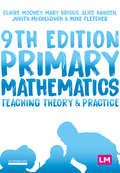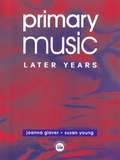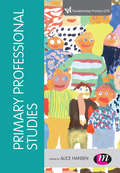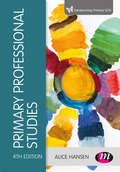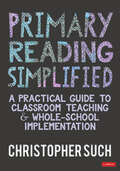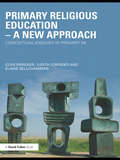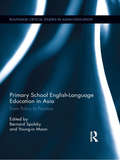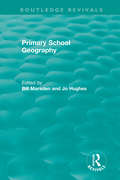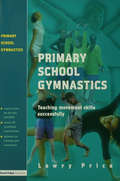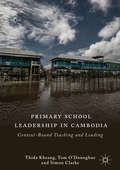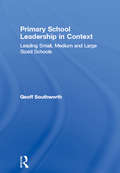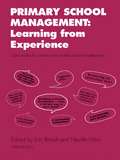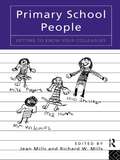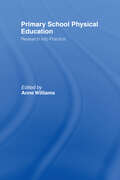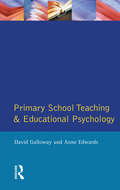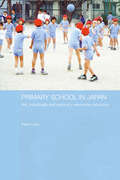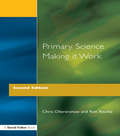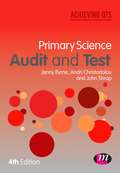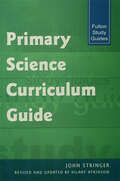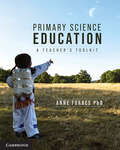- Table View
- List View
Primary Mathematics: Teaching Theory and Practice (Achieving QTS Series)
by Claire Mooney Alice Hansen Mary Briggs Mike Fletcher Judith McCullouchAn extensive knowledge of the primary Mathematics curriculum is not enough for you as a trainee teacher, you need to know how to teach Mathematics in the primary classroom. This is the essential teaching theory and practice text for primary Mathematics that takes a focused look at the practical aspects of teaching. It covers the important skills of classroom management, planning, monitoring and assessment and relates these specifically to primary Maths. Practical guidance, features and resources help you translate your learning to the classroom and understand the wider context of teaching: - Online practical lesson ideas for the classroom - The Primary National Curriculum for Mathematics in Key Stages one and two - Tips for planning primary Maths - Useful weblinks for primary Mathematics teaching The ninth edition of this popular book includes a new chapter on ′Mathematics in the primary classroom′ exploring primary mathematics teaching today. It is also updated to include the new ′Ready to progress′ criteria.
Primary Music: Later Years
by Susan Young Jo Glover Ms Susan YoungThe second of two practical classroom books on the teaching of music in primary schools, Primary Music: Later Years (7-11) combines for the first time an approach based on the centrality of the class teacher's responsibility for music, and working with the demands for subject knowledge and for appropriate progression at Key Stage 1.
Primary Phonics Max and the Fox
by Barbara MakarA systematic, phonics-based early reading program that includes: the most practice for every skill, decodable readers for every skill, and reinforcement materials--help struggling students succeed in the regular classroom
Primary Professional Studies (Transforming Primary QTS Series)
by Alice HansenThe changing landscape of primary teaching requires trainees to consider learning and teaching in new ways. This new book supports trainee teachers working towards primary QTS in all aspects of primary professional studies. Exploring the curriculum, the developing child, the developing teacher and teaching skills, the text offers in-depth coverage of all aspects of teaching and learning alongside practical teaching suggestions. Chapters on inclusion, teacher identity and the wider school community consider key issues in teaching and learning today. This second edition is newly linked to the 2012 Teachers' Standards and includes notes on the new National Curriculum. About the Transforming QTS Series This series reflects the new creative way schools are begining to teach, taking a fresh approach to supporting trainees as they work towards primary QTS. Titles provide fully up to date resources focused on teaching a more integrated and inclusive curriculum, and texts draw out meaningful and explicit cross curricular links.
Primary Professional Studies (Transforming Primary QTS Series)
by Alice HansenPrimary teacher training is challenging. Trainees must be prepared to consider teaching in innovative ways, while remaining focused on the unchanging requirements of children’s learning. The fourth edition of this popular core book supports trainee teachers working towards primary QTS who need to take account of the diverse aspects of primary professional studies. This is a comprehensive, core text for the primary professional studies module. It begins with an exploration of the curriculum and reviews the current curriculum. The text moves on to look at 'The Developing Child' encouraging students to focus on child-centred teaching and learning and explores the needs and learning journeys of all children. The fourth edition includes new chapters on technology and learning, mindfulness in the classroom, reflective practice and completing research and writing assignments for primary teacher training.
Primary Professional Studies (Transforming Primary QTS Series)
by Alice HansenPrimary teacher training is challenging. Trainees must be prepared to consider teaching in innovative ways, while remaining focused on the unchanging requirements of children’s learning. The fourth edition of this popular core book supports trainee teachers working towards primary QTS who need to take account of the diverse aspects of primary professional studies. This is a comprehensive, core text for the primary professional studies module. It begins with an exploration of the curriculum and reviews the current curriculum. The text moves on to look at 'The Developing Child' encouraging students to focus on child-centred teaching and learning and explores the needs and learning journeys of all children. The fourth edition includes new chapters on technology and learning, mindfulness in the classroom, reflective practice and completing research and writing assignments for primary teacher training.
Primary Reading Simplified: A Practical Guide to Classroom Teaching and Whole-School Implementation
by Christopher Such"Such’s passion and knowledge for reading shines through. This is a thoughtful text as well as a practical one." - Schools Week- From the bestselling author of The Art and Science of Teaching Primary Reading, this is your essential guide to teaching reading in primary schools. Filled with classroom-tested, practical guidance, this book addresses common questions faced in every school by those seeking to improve reading. It offers a clear, evidence-informed approach that maximises the chances of all children becoming capable, confident readers. Explore how to lay the foundations for reading development. Learn effective approaches to organising classroom instruction. Understand how to build a reading curriculum and nurture a reading culture. Consider nuanced approaches to assessing and supporting pupils. Examine how to lead professional development and implement change in teaching reading across your school. Each bite-sized chapter is supported by smart summaries, retrieval quizzes to test your understanding, questions for professional development discussions and links to more specialised reading on every topic. This is an unmissable resource for primary teachers and those leading literacy teaching in primary schools.
Primary Reading Simplified: A Practical Guide to Classroom Teaching and Whole-School Implementation
by Christopher Such"Such’s passion and knowledge for reading shines through. This is a thoughtful text as well as a practical one." - Schools Week- From the bestselling author of The Art and Science of Teaching Primary Reading, this is your essential guide to teaching reading in primary schools. Filled with classroom-tested, practical guidance, this book addresses common questions faced in every school by those seeking to improve reading. It offers a clear, evidence-informed approach that maximises the chances of all children becoming capable, confident readers. Explore how to lay the foundations for reading development. Learn effective approaches to organising classroom instruction. Understand how to build a reading curriculum and nurture a reading culture. Consider nuanced approaches to assessing and supporting pupils. Examine how to lead professional development and implement change in teaching reading across your school. Each bite-sized chapter is supported by smart summaries, retrieval quizzes to test your understanding, questions for professional development discussions and links to more specialised reading on every topic. This is an unmissable resource for primary teachers and those leading literacy teaching in primary schools.
Primary Religious Education – A New Approach: Conceptual Enquiry in Primary RE
by Clive Erricker Judith Lowndes Elaine BellchambersThe role of Religious Education within the primary school and how it should be implemented has been the subject of worldwide debate. Responding to the delivery of the non-statutory framework for RE and the recent emphasis on a creative primary curriculum Primary Religious Education - A New Approach models a much needed pedagogical framework, encouraging conceptual enquiry and linking theory to its implementation within the wider curriculum in schools. The book outlines this new conceptual approach to Religious Education and is based upon the Living Difference syllabus successfully implemented in Hampshire, Portsmouth, Southampton and Westminster. It demonstrates how to implement the requirements of the new QCDA curriculum and Ofsted criteria for effective RE and is rapidly gaining both national and international support. Through this approach, Religious Education is discussed within the larger context of primary education in the contemporary world. This book will help you to teach RE in a creative way in the primary classroom by providing: historical commentaries an overview of existing approaches case studies based upon developments in religious literacy connections to initiatives such as Every Child Matters and cross-curricular links to other areas of the curriculum, including PSHE. With an all-encompassing global context, this book provides tutors, students and practicing teachers with a firm basis for developing their thinking about the subject of RE, how it is placed in the primary curriculum and how it may be successfully implemented in schools.
Primary School English-Language Education in Asia: From Policy to Practice (Routledge Critical Studies in Asian Education #1)
by Bernard Spolsky Young-In MoonIn Asia, English is no longer a foreign language but a key resource for education, government, business and the general public. Whereas thirty years ago, British and American experts believed that the best way to improve the quality of English teaching was to cancel any programs below the secondary level, Asian nations as well as European are now introducing English in primary school. But there are major obstacles to overcome: the training of enough local teachers or the hiring of English speakers, the preparation of suitable teaching materials, the development of useful tests, and the design of workable curriculums. The chapters in this book, written by leading English-teaching professionals in seven Asian countries and originally delivered at the 2010 annual conference of Asia TEFL which took place in Hanoi, Vietnam, describe and analyze national policies and how they are implemented. The coverage is wide: China with its huge number of students learning English, Japan working to make the transition from elementary to secondary school seamless, Singapore continuing to use English as medium of instruction for its multilingual population, Korea developing English education policies to recognize the increased role of English alongside the national language, India building on its colonial past to make English an economic resource, Vietnam fitting English into a program of national rebuilding, and Taiwan spreading its English teaching outside the national capital. This is not a report of the views of outside experts, but of local experiences understood by local scholars of international standing. Policy makers, educators, researchers and scholars will be able to gain valuable insights from Asian experts.
Primary School Geography (Routledge Revivals)
by Bill Marsden Jo HughesPublished in 1994, this book is the result of the collaborative work undertaken at the Liverpool-based Geography INSET Primary Project (GIPP) over three years. It presents a series of chapters for primary teachers seeking to implement the Statutory Orders for Geography in the National Curriculum. Steering a middle course between the sophistications of a theoretical/methodological text and the over-simplifications of a ‘tips-for-teachers’ approach, the authors highlight the positive opportunities offered by the National Curriculum. At the same time they are critical of many aspects of the Statutory Orders, without losing sight of their objective to help teachers to improve the quality of primary geography teaching. The book is especially useful for INSET work for teachers who have already grappled with National Curriculum Geography and who will be adjusting to the post-Dearing rearrangements.
Primary School Gymnastics: Teaching Movement Action Successfully
by Lawry PriceThis book is designed to help teachers develop well-structured and progressive programs of gymnastics activities for primary-aged children (3-11 years). In gymnastics, children learn not only how their bodies move and how body parts work in co-operation with other parts, but they are also able to develop awareness of space and a sense of control. Practical Primary Gymnastics presents themed activities appropriate for infant, junior and upper junior levels, and shows how teachers can plan to use these in structured themes of work. The activities aim to broaden children's abilities in: jumping and landing skills; rolling actions; taking weight on different body parts; using a range of traveling actions; and working at floor level and using gymnastic apparatus at varying heights. Gymnastics is a fundamental part of the PE curriculum. This book offers practical help for teachers in this vital area and focuses on enabling individual children to succeed at their own level.
Primary School Leadership in Cambodia: Context-bound Teaching And Leading
by Simon Clarke Tom O'Donoghue Thida KheangThis book investigates the relationship between context and leadership in post-conflict Cambodia. Building on the understanding that approaches to leadership are tightly woven within the contexts that leaders operate, the authors examine the case of primary school leadership in Cambodia. A low-income and post-conflict society rocked by civil war and genocide between the 1960s and the 1990s, the country is – perhaps unsurprisingly – faced with numerous challenges as it engages in the process of national rehabilitation and reconstruction, particularly in relation to the education system. The authors provide a comprehensive historical background to primary school leadership not only in Cambodia, but in post-conflict environments more broadly: informing school leadership preparation, development and support, and facilitating understanding of the context in which school leaders work. This book will be of value to students and scholars of primary school education and education in post-conflict countries, as well as to practitioners and policy makers.
Primary School Leadership in Context: Leading Small, Medium and Large Sized Schools
by Geoff SouthworthHow does school leadership differ in different sized primary schools?This book responds to the urgent need to explore how different contexts influence the nature and character of primary school leadership and shows how headteachers in different sized schools shape their leadership accordingly.Geoff Southworth draws on a trilogy of related research projects, which investigated leadership in small, medium and large sized primary schools, and sets out the main features of leadership in each category. He presents an evidence-informed portrait of leadership is presented, drawing on the views and experiences of heads, deputies, teachers and governors. As well as focussing on school size the book considers the following related issues:* Learning centred leadership - influencing what happens in classrooms* Structures and systems in schools - how leaders use them* Developing leaders and leadership - the importance of building leadership capacityThis informative book sets out in a straightforward way what leaders in different sized schools need to attend to and provides many examples of how leaders can do this. Primary School Leadership in Context will be particularly valuable to headteachers, deputies and subject leaders in primary schools, those who aspire to these positions, and those who are moving schools in search of promotion. Academics and students of school leadership will also find the book useful.
Primary School Management: Case Studies by Primary and Middle School Headteachers
by Eric Briault Neville WestThis lively book is based on case studies written by heads from a variety of settings, each of them facing different problems and concerns. The issues raised are examined in-depth, including: * improving the quality of pupils' learning experience * effective staff organisation and development * development of policy and the management of resources * establishing good relaionships between the head, the school and the community
Primary School People: Getting to Know Your Colleagues
by Jean Mills Richard W. MillsBeginning to teach in a primary school means establishing a whole new set of relationships - with your class of course, but also with the other adults who work in the school. These include teachers and teaching assistants, support staff of various kinds from the visiting educational psychologist to the essential school secretary and parents, both as helpers in the school and as the major influences on their children's lives outside school. This book is designed to give students and newly qualified teachers a taste of what they can expect and to help them to get the most out of these relationships both for themselves and for their children. Throughout, it draws upon the experiences of new teachers, often in their own words, but it also uses the voices of other `primary school people' to show students the view from the other side. Throughout, the text is supported by points for discussion, questionnaires and check lists to help new teachers to define and analyse their own situation.
Primary School Physical Education: Research into Practice
by Anne WilliamsThis book aims to put right the fact that there is a dearth of texts written specifically for primary school teachers, which provides information about key issues and current research evidence in ways which are comprehensible to a non-specialist and which guide practice. The ability to use research evidence to improve and inform practice is now a requirement for the award of QTS.
Primary School Teaching and Educational Psychology (Effective Teacher, The)
by Anne Edwards David GallowayDrawing upon extensive research, David Galloway and Anne Edwards analyse the increasing pressures on teachers from the national curriculum and other recent legislation. They look carefully at childrens' learning and behavioural difficulties and show how educational psychology can extend our understanding of teacher's day-to-date work in the classroom. Primary Teaching and Educational Psychology is a refreshing and at times controversial examination of primary teaching and the application of educational psychology. It will be essential reading for trainee teachers and will stimulate more experienced teachers to re-evaluate their current practices.
Primary School in Japan: Self, Individuality and Learning in Elementary Education (Japan Anthropology Workshop Series)
by Peter CaveThe balance between individual independence and social interdependence is a perennial debate in Japan. A series of educational reforms since 1990, including the implementation of a new curriculum in 2002, has been a source of fierce controversy. This book, based on an extended, detailed study of two primary schools in the Kinki district of Japan, discusses these debates, shows how reforms have been implemented at the school level, and explores how the balance between individuality and social interdependence is managed in practice. It discusses these complex issues in relation to personal identity within the class and within the school, in relation to gender issues, and in relation to the teaching of specific subjects, including language, literature and mathematics. The book concludes that, although recent reforms have tended to stress individuality and independence, teachers in primary schools continue to balance the encouragement of individuality and self-direction with the development of interdependence and empathy.
Primary Science
by John Sharp Graham Peacock Rob Johnsey Debbie WrightThis dictionary has been updated with new headwords, now over 650, makingit more comprehensive. Each entry is in alphabetical order and along with aclear and straightforward definition, has a funky colour illustration or diagramto help explain the meaning. Cross references link the user to other usefulwords in this dictionary so it is easy to build up vocabulary quickly. Thecolourful, modern design and artwork make it easy to pick out the word you need,and fully understand it.
Primary Science - Making It Work
by Chris Ollerenshaw Ron RitchieFirst Published in 1997. Routledge is an imprint of Taylor & Francis, an informa company.
Primary Science Audit and Test: Audit And Test (Achieving QTS Series)
by John Sharp Jenny Byrne Andri ChristodoulouIf you are a primary trainee, you must demonstrate a knowledge of science to be recommended for QTS. This popular, widely recommended, text helps you audit your knowledge of science and understand what learning you need to pass your course. A rigorous test helps you identify your strengths and weaknesses and can be revisited at key stages in your course as a tool to monitor and evaluate progress. The fourth edition has been updated in line with the new National Curriculum, includes more information on expanding and developing your knowledge of science and is linked to the 2012 Teachers' Standards.
Primary Science Curriculum Guide
by John StringerThis guide provides trainee teachers with an insight into the nature and teaching of primary science. It aims to introduce you to the ways in which children learn science, and to the science itself. Each Unit can be studied independently or used to support/prepare for school experiences. You will be directed towards additional reading, which will develop or confirm the subject knowledge you will need to achieve QTS. the curriculum guide is up-to-date, revised to take account of Curriculum 2000 and accepted 'good practice' in primary science teaching and learning. It is also flexible - many of the Units are stand-alone. They can be undertaken in any order, at your own pace, to complement school experiences. The Units are practical and feasible: the activities suggested can be undertaken by the non-specialist; in many cases without specialized equipment or access to large numbers of pupils. The guide is comprehensive, covering all the primary science elements in Curriculum 2000 and giving background information into other aspects of primary science teaching. It is also supportive - the guide suggests further texts to support trainees' own understanding of the scientific and pedagogical concepts involved. Additional reading draws on the TTA's list of approved key texts. The original text was piloted by students following a distance-learning PGCE course. It has been revised and updated in line with their comments and to meet Curriculum 2000 and Curriculum Guidance for the Foundation Stage. The text was initially developed as a core text for the part-time distance-learning course at Liverpool Hope and is designed for trainee teachers on distance learning and flexible routes, returning, converting or overseas teachers.
Primary Science Education: A Teacher's Toolkit
by Anne ForbesPrimary Science Education: A Teacher's Toolkit is an accessible and comprehensive guide to primary school science education and its effective practice in the classroom. Primary Science Education is structured in two parts: Planning for Science and Primary Science in the Classroom. Each chapter covers fundamental topics, such as: curriculum requirements (including the Australian Curriculum and Australian Professional Standards for Teachers); preparing effective learning sequences with embedded authentic assessment; combining science learning with other learning areas, such as technologies and STEM; and critically analysing the teacher's role in the classroom. The text features short-answer and 'Bringing it Together' questions to encourage readers to consolidate their understanding of key themes. Case studies throughout provide guidance on the classroom experience and Teacher Background Information boxes explore topics where more in-depth knowledge is required. The book is supported by a suite of online resources, including interviews with Australian primary teachers and students, and downloadable activities.
Primary Science Teaching Theory and Practice
by John Sharp Graham Peacock Rob Johnsey Shirley Simon Robin Smith Alan Cross Diane HarrisThe 6th edition of this popular core text provides the essential teaching theory and practice for primary science. It promotes effective teaching through secure pedagogical knowledge, covering the key skills of planning, monitoring and assessment and class management, and relating these specifically to primary science. This 6th edition is linked to the 2012 Teachers' Standards. With full coverage of the theory and practice required for effective and creative science teaching, this text is an essential guide for all trainees working towards QTS. Throughout, practical guidance and features support trainees to translate this learning to the classroom, embed ICT in their lessons and to understand the wider context of their teaching. Trainees will find it helpful to use this book alongside Primary Science Knowledge and Understanding. About the Achieving QTS series All the books in this successful series support trainees through their initial teacher training and guide them in the acquistion of their subject knowledge, understanding and classroom practice. All new titles within the series link to the 2012 Teachers' Standards and take into account recent changes in Initial Teacher Training.
